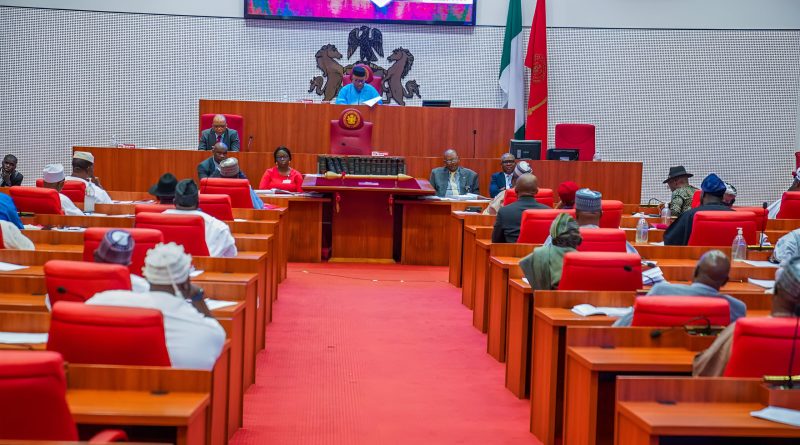Electoral Act Amendment Bill passes second reading in Senate
A bill seeking to repeal the Electoral Act 2022 and enact a new Electoral Bill 2025 has passed second reading at the Senate.
The Senate President, Godswill Akpabio, announced the passage during Wednesday’s plenary after a majority of senators supported it through a voice vote.
Following its passage, the bill was referred to the Senate Committee on Electoral Matters for further deliberation and a public hearing.
The committee was directed to report back within two weeks.
The bill, sponsored by the Chairman of the Senate Committee on Electoral Matters, Simon Lalong (APC, Plateau South), aims to strengthen the legal framework governing elections in Nigeria.
The bill was initially presented for second reading last Thursday, but was stepped down to allow for wider consultation. It, however, resurfaced during Wednesday’s session, where lawmakers extensively debated its general principles.
While presenting the bill, Mr Lalong acknowledged that the Electoral Act 2022 introduced significant reforms but also revealed certain weaknesses, such as delays in the release of election funds, disputes over voter registers, conflicting interpretations of result transmission, and weak enforcement of electoral offences.
He explained that the new legislation seeks to enhance the independence of the Independent National Electoral Commission (INEC) by insulating it from political interference and government control.
The debate
During the debate, Adamu Aliero (APC, Kebbi North) called for the inclusion of clear provisions on the electronic transmission of results.
He urged his colleagues to strengthen the use of the Bimodal Voter Accreditation System (BVAS) to ensure transparency in elections.
Orji Kalu (APC, Abia North) encouraged all lawmakers, including those in the opposition, to work together towards building a transparent electoral process.
Tahir Munguno (APC, Borno North) advocated for transparent party primaries, reduced election spending, and stronger measures against vote-buying.
Agom Jarigbe (PDP, Cross River North) supported provisions for electronic result transmission and independent candidacy, while Olalere Oyewunmi (PDP, Osun West) called for stiffer penalties for electoral offenders, including INEC and security officials who compromise elections.
Mr Oyewunmi, the deputy minority leader, lamented that most individuals found guilty of electoral offences have not been adequately sanctioned.
Patrick Ndubueze (APC, Imo North) proposed that election results should be compiled and announced within six hours of voting, while Adams Oshiomhole (APC, Edo North) emphasised the need to eliminate electoral violence.
Mr Oshiomhole accused politicians of arming thugs to cause mayhem during elections and urged his colleagues to desist from such practices.
Seriake Dickson (PDP, Bayelsa West) suggested that the amendment should empower INEC to determine the true winner of elections and check the excesses of political parties.
Senate president’s remarks
In his closing remarks, the senate president noted that the credibility of Nigeria’s elections has improved since the ruling All Progressives Congress (APC) assumed power in 2015, but added that more work is needed to achieve full transparency.
“INEC must be made responsible because they are the ones in possession of electoral materials. We’ve had improvements, but we need to do more,” Mr Akpabio said.
He thereafter put the bill to a voice vote, and the senators overwhelmingly supported it.
Highlights of the proposed amendment to the Electoral Act
The proposed Electoral Act 2025 introduces reforms aimed at strengthening Nigeria’s electoral governance, enhancing the independence of INEC, and promoting greater transparency and accountability across political and electoral processes.
READ ALSO: UPDATED: Reps probe $460m Abuja CCTV project funded by China loan
The new provisions address key areas such as funding, candidate qualification, voter registration, political party operations, campaign financing, and electoral offences.
Some major amendments include Section 3(3), which mandates the early release of INEC funds to ensure the timely preparation and execution of electoral activities.
Section 5: Requires INEC to submit audited financial statements within six months after the end of each financial year.
Section 10(2)(c): Adds the National Identification Number (NIN) as part of the requirements for voter registration.
Sections 12(1)(d) and 12(2) seek to recognise the voting rights of inmates, provided that the INEC makes the necessary arrangements for their registration and participation in elections.
Section 27(5–7): Prescribes clear notice and timetables for elections, mandating that presidential and gubernatorial elections be held no later than 185 days before the expiration of the incumbent’s tenure.
Section 44: Introduces provisions for mandatory early voting.
Section 60(5): Makes electronic transmission of results compulsory to enhance transparency and reduce electoral malpractice.

